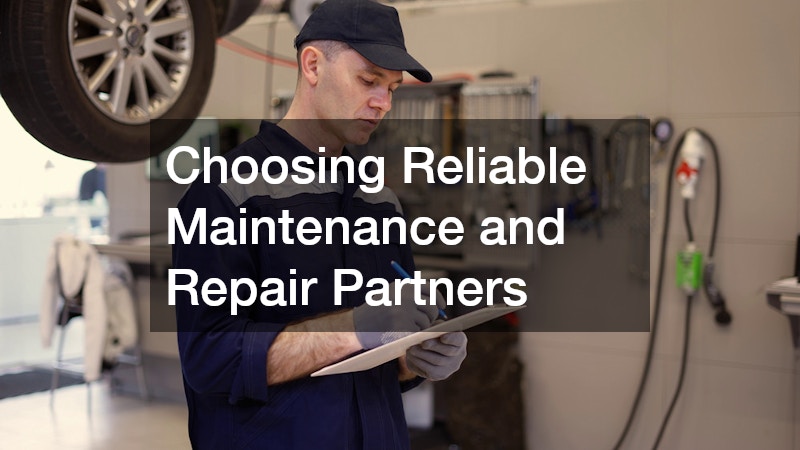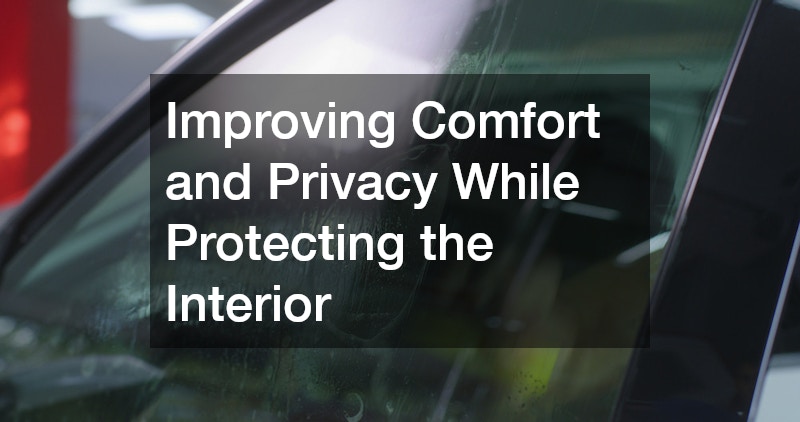
Owning a car is more than just having a way to get from point A to point B—it’s about taking care of a valuable asset that provides convenience, freedom, and peace of mind. Whether it’s used for daily commuting, family trips, or special occasions, every vehicle benefits from proactive attention that addresses both performance and long-term preservation. Unfortunately, many owners focus only on cleaning or fueling, overlooking the broader maintenance and protective actions that can prevent costly problems down the road.
Caring for a vehicle thoroughly requires attention to multiple aspects, including interior comfort, exterior durability, mechanical reliability, and overall security. By implementing preventive strategies and seeking professional guidance when needed, you can ensure your car runs efficiently, lasts longer, and remains enjoyable to drive. From improving comfort and reducing wear to staying on top of inspections and routine maintenance, proactive care reduces the risk of unexpected breakdowns and expenses.
This article explores ten key areas of vehicle protection, providing practical advice and actionable tips you can start using immediately. You’ll learn how small upgrades and regular maintenance contribute to a safer, more dependable car, and how addressing both visible and hidden components helps preserve performance, comfort, and value. We’ll also cover strategies to keep your car secure, repair minor damage before it worsens, and protect it from environmental wear.
Many owners underestimate the cumulative effect of consistent, small actions. Checking fluid levels, monitoring tire pressure, and keeping the interior clean are simple steps that prevent larger problems over time. Combining daily care with professional services creates a long-lasting, safe, and comfortable driving experience. By understanding and acting on these areas, you can develop a holistic approach that keeps your vehicle in excellent condition for years. Every element, from the interior to the exterior and mechanical systems, plays a role in safeguarding your investment and enhancing your driving experience.
Improving Comfort and Privacy While Protecting the Interior
One of the most effective ways to protect your car’s interior while enhancing comfort and privacy is through auto window tinting. This service goes beyond aesthetic appeal; it provides practical benefits that improve both your daily driving experience and the long-term condition of your vehicle. Tinting reduces the amount of ultraviolet (UV) light entering the car, which helps prevent fading and cracking of upholstery, dashboards, and interior trim. It also minimizes glare from the sun, making driving safer and more comfortable, particularly during bright afternoons or long trips.
Window tinting also significantly improves privacy, preventing passersby from easily seeing inside the vehicle. This is particularly useful when leaving valuable items in the car or when parked in high-traffic areas. In addition to security benefits, tinted windows contribute to climate control by reducing heat buildup inside the vehicle. A cooler cabin means your air conditioning system works more efficiently, reducing fuel consumption and mechanical strain.
For best results, professional installation is highly recommended. Experts ensure that the tint is applied smoothly, adheres correctly to the glass, and complies with local legal limits on tint darkness. Supplementing tinted windows with sunshades or seat covers adds an extra layer of protection for your interior, keeping your car comfortable and preserving its resale value over time. Consider applying protective coatings on the dashboard or leather conditioner on seats to extend the life of interior materials. These small steps combine with window tinting to maintain a pristine, comfortable interior environment.
Understanding Your Coverage and Risk
Every car owner should understand the details of their insurance policy, as coverage can directly impact financial protection in the event of an accident, theft, or natural disaster. Consulting with a reliable car insurance company ensures that your coverage aligns with your driving habits, vehicle value, and risk tolerance.
Insurance policies typically include components such as liability, comprehensive, and collision coverage. Liability covers damages you may cause to others, comprehensive handles non-collision events like theft or weather damage, and collision coverage addresses repair costs following an accident. Knowing your deductible and limits is crucial for making informed decisions when incidents occur. Homeowners and drivers alike can benefit from reviewing their policies regularly. Many insurers offer discounts for safety features, such as alarms, GPS tracking, or secure parking arrangements. Additionally, documenting the current condition of your car with photos and detailed notes can streamline claims processing. For older vehicles, consider the cost-benefit of comprehensive coverage versus liability-only coverage to optimize your insurance strategy. Being proactive in understanding coverage not only prevents surprises during stressful events but also ensures that you are adequately protected financially and legally.
Keeping Your Vehicle Running Smoothly
Modern vehicles rely heavily on sophisticated systems that monitor and manage everything from engine performance to emissions. Using professional auto diagnostic services helps identify potential issues before they escalate into expensive repairs. Diagnostics involve scanning the vehicle’s electronic control units to detect warning codes and anomalies, providing a clear picture of your car’s mechanical health.
Regular diagnostics allow owners to address problems early, whether it’s a minor sensor malfunction, a fuel system inefficiency, or a transmission concern. Ignoring early warning signs can lead to more extensive damage, reduced fuel efficiency, and even safety hazards. By partnering with a qualified technician for routine diagnostic checks, drivers can ensure that their car remains reliable, runs efficiently, and avoids costly downtime. Diagnostics can also detect issues that are not immediately visible to the driver, such as subtle misfires, emission irregularities, or battery inefficiencies. Early detection of these problems allows for timely repair, reducing wear on other components and extending the life of your vehicle. Maintaining a proactive approach to diagnostics also helps with resale value, as buyers appreciate a car that has documented maintenance records and no lingering issues, making your vehicle more attractive and trustworthy in the used car market.

Choosing Reliable Maintenance and Repair Partners
Finding a dependable auto repair shop is a cornerstone of effective car protection. Whether it’s for routine maintenance, seasonal checks, or unexpected repairs, a trusted service provider ensures quality work, transparency, and long-term reliability. When selecting a repair shop, it’s important to verify certifications, read reviews, and confirm that the technicians are trained to work on your specific make and model. A reliable shop provides written estimates, clear explanations of required repairs, and warranties on their work. Maintaining an ongoing relationship with a repair shop allows for consistent service, helping track your car’s maintenance history and making it easier to identify recurring issues. Choosing a reputable shop also minimizes the risks associated with subpar repairs, which can compromise safety and lead to higher expenses in the future. Developing a checklist of trusted service providers for oil changes, tire rotations, and seasonal inspections ensures that your car receives the attention it needs without delay. Prioritizing quality over cost ensures that your car remains safe, functional, and well-maintained for years to come.
Ensuring Your Brakes Are Always Dependable
The braking system is arguably the most critical safety component of any car. Regular brake repairs are essential to ensure that your vehicle can stop reliably under all conditions. Common signs that brake attention is needed include squealing or grinding noises, vibration during braking, or longer stopping distances.
Homeowners should schedule routine inspections of brake pads, rotors, calipers, and brake fluid levels. Addressing even minor wear promptly prevents more extensive damage and protects both the driver and passengers. Brake repairs are not just about safety—they also preserve vehicle performance and reduce the likelihood of accidents caused by equipment failure.
Professional evaluation ensures that brakes function properly under stress and that all components meet manufacturer standards. Waiting too long to repair worn brakes can result in costly rotor or caliper damage, which is far more expensive to replace than routine maintenance. Drivers should also be aware of subtle changes, like soft or spongy brake pedals, which may indicate hydraulic issues that require immediate professional attention.
Maintaining Overall Brake System Health
In addition to immediate repairs, proactive auto brake services help maintain the overall health of the braking system. Comprehensive services include fluid replacement, rotor resurfacing, and system inspections that address issues before they become critical. Following manufacturer-recommended service intervals keeps brake performance at optimal levels. Preventive maintenance prevents uneven wear, reduces the risk of failure, and ensures that all components are properly lubricated and calibrated. By addressing minor issues early, vehicle owners avoid total system failures and maintain peace of mind during daily driving. Regular service extends the lifespan of brake components, enhances safety, and contributes to smoother driving performance. Brake maintenance also includes checking the condition of brake lines and ABS sensors. Ensuring the entire system is functioning correctly helps prevent catastrophic failures, especially in emergency stopping situations. A comprehensive approach to brake health reduces stress, promotes confidence behind the wheel, and protects everyone on the road.

Securing Your Vehicle Against Theft and Lockouts
No matter how reliable your car is mechanically, security remains a major concern. Engaging a professional car locksmith ensures that your vehicle is protected against theft and that you have access solutions in emergencies. Locksmiths provide key replacements, lock repairs, and anti-theft system upgrades to keep your car secure. Homeowners should maintain the contact information of a licensed locksmith for quick assistance during lockouts or lost key situations. Modern locksmiths can also install transponder keys, remote fobs, and other advanced security devices. Attempting DIY lock repairs can cause damage to the locking mechanism, leading to more expensive repairs. Additionally, many locksmiths offer preventative security solutions such as steering wheel locks, keyless entry upgrades, and alarm systems that complement other protective measures. Investing in professional locksmith services safeguards both your vehicle and your peace of mind, ensuring that even in an emergency, you can regain access without compromising safety or convenience.
Repairing Damage Promptly to Maintain Value
Accidents happen, and timely attention to vehicle damage is crucial. Certified collision repair services restore the integrity, appearance, and safety of your car after any accident. Immediate repair helps prevent further damage, such as rust or structural issues, and ensures that your car maintains its resale value. After an accident, documenting damage through photos and notes is important for insurance purposes. Working with professionals ensures that repairs are completed to manufacturer standards, preserving safety features like crumple zones and airbags. Coordinating with your insurance provider allows for a smoother claims process and guarantees that repairs are covered appropriately. Prompt collision repair protects both the functionality and appearance of your car. Some car owners underestimate minor dings or scratches, but even small impacts can lead to corrosion over time if left untreated. Quick intervention not only maintains aesthetics but also prevents hidden structural damage, keeping your car safe and reliable for years.
Preserving Exterior Appearance and Protection
Maintaining the car’s exterior is as important as mechanical upkeep. A trusted auto body service addresses dents, scratches, paint chips, and rust to keep your car looking its best and prevent long-term damage. Cosmetic maintenance is not only about aesthetics—it also protects metal surfaces from corrosion and structural weakening. Professional detailing, paint correction, and protective coatings can extend the life of your car’s exterior. Inspections for rust or compromised panels allow owners to act quickly, preventing small issues from escalating. In addition, detailing services often include underbody cleaning, which removes road salts and debris that contribute to corrosion. Investing in auto body services ensures that your car maintains its appearance, performs safely, and retains market value over time.

Protecting Your Vehicle from the Elements
Environmental protection plays a major role in vehicle longevity. Carport construction provides shelter from sun, rain, snow, and other harsh elements. A well-built carport reduces weather-related damage, prevents interior heat buildup, and minimizes the need for frequent washes and detailing. Homeowners should ensure that the carport is constructed from durable materials with proper drainage to avoid water pooling or snow accumulation. Covered parking reduces UV exposure, protects paint, and prevents rust formation. Combining a carport with routine cleaning and waxing maximizes your vehicle’s exterior longevity and minimizes long-term maintenance costs. A carport can also serve as a multipurpose space for minor maintenance tasks, such as tire rotations, detailing, or battery checks, without exposing your car to environmental hazards. By integrating shelter with ongoing care, you create a holistic approach that preserves both performance and appearance.
Protecting your car inside and out requires a comprehensive, proactive approach. From interior enhancements like window tinting to understanding insurance coverage and conducting routine diagnostics, each action contributes to your vehicle’s performance, safety, and value. Partnering with reliable auto repair shops, maintaining your brakes, and addressing damage promptly ensures that your car remains dependable under all driving conditions. Security is equally important, and services like locksmith support and anti-theft measures safeguard your investment against theft and lockouts. Exterior protection through auto body maintenance, collision repair, and covered parking adds longevity and preserves the vehicle’s appearance. By taking a holistic approach—covering mechanical reliability, aesthetic upkeep, and environmental protection—car owners can avoid costly repairs, reduce risks, and enjoy a safer, more comfortable driving experience.
Consistent care, attention to detail, and professional guidance transform a vehicle from a basic means of transportation into a well-maintained, high-performing asset. By addressing interior comfort, mechanical systems, security, cosmetic concerns, and shelter, you ensure a long-lasting, resilient, and enjoyable driving experience. Protecting your car is an investment in your safety, convenience, and peace of mind, and the strategies outlined here provide a practical roadmap to achieving that goal. With proactive maintenance, trusted professional services, and preventive measures in place, your vehicle will remain reliable, safe, and attractive for years to come, providing confidence every time you hit the road.


